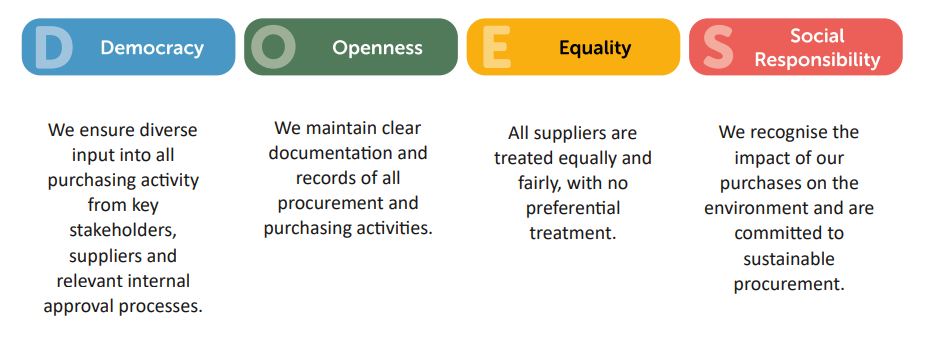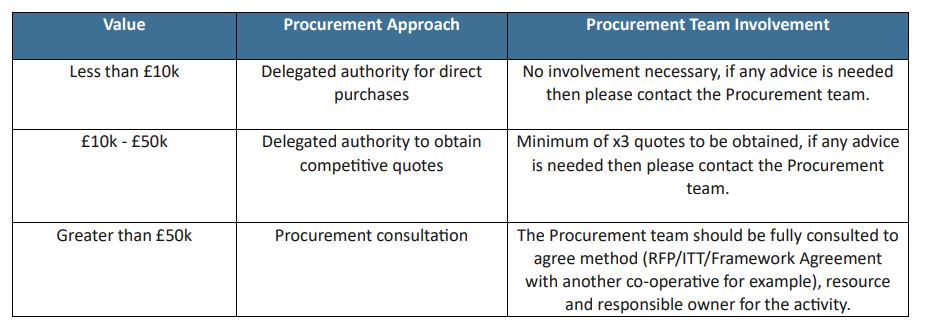Purchasing Policy and Procedures Manual (Goods Not For Resale)
Last Updated 17 Feb 2025 in Business Conduct
Policy
1. Purpose
This policy outlines the rules for Goods Not For Resale (GNFR) purchasing and procurement and should be read in conjunction with the Contracts Process. GNFR is often referred to as indirect procurement, being anything which we do not sell onto customers but is required for our business to maintain operations. This policy will be reviewed annually and may be amended as necessary to reflect changes in legislation, best practices, and the operational needs of The Midcounties Co-operative. All colleagues involved in purchasing activities are required to comply with this policy. Failure to adhere to these guidelines may result in disciplinary action.
2. Objectives
The Policy commits the Society and every individual involved in purchasing, procurement and supply management processes, to use their best endeavours to ensure that our purchasing and contracting activities:
-
Are transparent, equitable, and in accordance with legal requirements.
-
Achieve best value while maximising quality, sustainability, ethical sourcing and innovation.
-
Reduce supply chain risk
-
Promote co-operative principles in procurement decisions.
-
Foster relationships with local suppliers and support the community.
3. Values
To build a fairer, more sustainable and ethical future, our DOES values guide our key principles for purchases:

4. Principles
Legality – All purchasing and contracting activity will fully respect and comply with all applicable laws, directives and regulations. There are several Society policies which are associated with, and should be adhered to, in conjunction with this policy, these include:
• Modern Slavery & Human Trafficking Policy
• Anti-Facilitation of Tax Evasion Policy
Accountability and Auditability – All purchases are approved and recorded on our finance system. Tender activity and supplier selection is documented, and our contracts are recorded and maintained on an electronic contracts database system.
Sustainability - Purchasing decisions are based on a balance between economic, social and environmental factors, and we work continuously with our suppliers to reduce the impact of our supply chain. We recognise the essential contribution that our suppliers make in achieving our aims and aspirations for sound sourcing. We require our suppliers to sign an Ethical Code of Conduct to confirm their commitment to conducting business ethically and in line with our values.
Economic Effectiveness – Subject to legal, ethical and other relevant considerations, the desired outcome of all purchases is that of greatest value gained at lowest total cost, to ensure members money is spent effectively. Value extends beyond just the cost of purchase and encompasses multiple factors such as total cost of ownership, quality, supplier relationships, risk management, innovation, added value elements etc.
Risk Management – Our supply chain exposes the Society to a wide variety of risks such as supply stability, regulatory, financial, social and environmental. Through the Contracts Process and appropriate supplier due diligence, we identify and mitigate such risks.
Innovation and Continuous Improvement – We take care not to reduce or eliminate competitive development, ensuring the supply chain does not lose the ability to adapt to new or emerging technologies and processes. Consideration shall be given to suppliers who not only offer the best current solution but are also best placed and resourced to offer further innovation and improvement in the future.
Conflicts of Interest – When dealing with suppliers, potential conflicts of interest can sometimes arise. Such potential conflicts should be reported to a manager as soon as they are identified. They may not prevent our trading with the company concerned but full will require disclosure for review.
Purchasing Procedure
It is recognised that the Society is made up of several operating groups and business units with differing purchasing requirements and needs, to fulfil our services to the customer, as well as having different technology applications in which to carry out these procedures. There are however, common guidelines between the procedures of each group and business entity: Procurement Approach The Procurement team should be consulted for the initiation and renewal of all contracts/purchases, and when considering exiting an agreement. The level of involvement will depend on a variety of factors including resource availability, market conditions and the lifetime value of the contract as outlined below, but consideration should also be given to complexity regardless of value (i.e. purchases of strategic importance, high risk, cross-trading).

Spend Approval Colleagues will need to obtain spend approval for their purchases in line with the thresholds below, in addition to consulting with their relevant operational committees. This applies to renewals as well as new purchases:
• Finance Governance Committee – where the lifetime value of the contract is greater than £50k
• Board of Directors – where the lifetime value of the contract is greater than:
o £250k for CAPEX purchases
o £500k for OPEX purchases
Supplier Selection Suppliers will be evaluated fairly, the criteria is interchangeable and depends on the purchase and market conditions but will include financial, qualitative, technical and sustainable aspects. Whilst we do not publish detailed selection criteria, we offer open and honest feedback to all suppliers in line with our values, so they can address areas of improvement.
All purchasing decisions must be documented for audit purposes, including quotes, rationale for selection, and contract details.
Preference will be given to local suppliers and co-operative businesses where feasible.
|
Policy name: |
Purchasing Policy & Procedures Manual |
Date of last review: |
February 2025 |
|
Policy owner: |
Procurement |
Issue number: |
Procurement-AW-005 |







